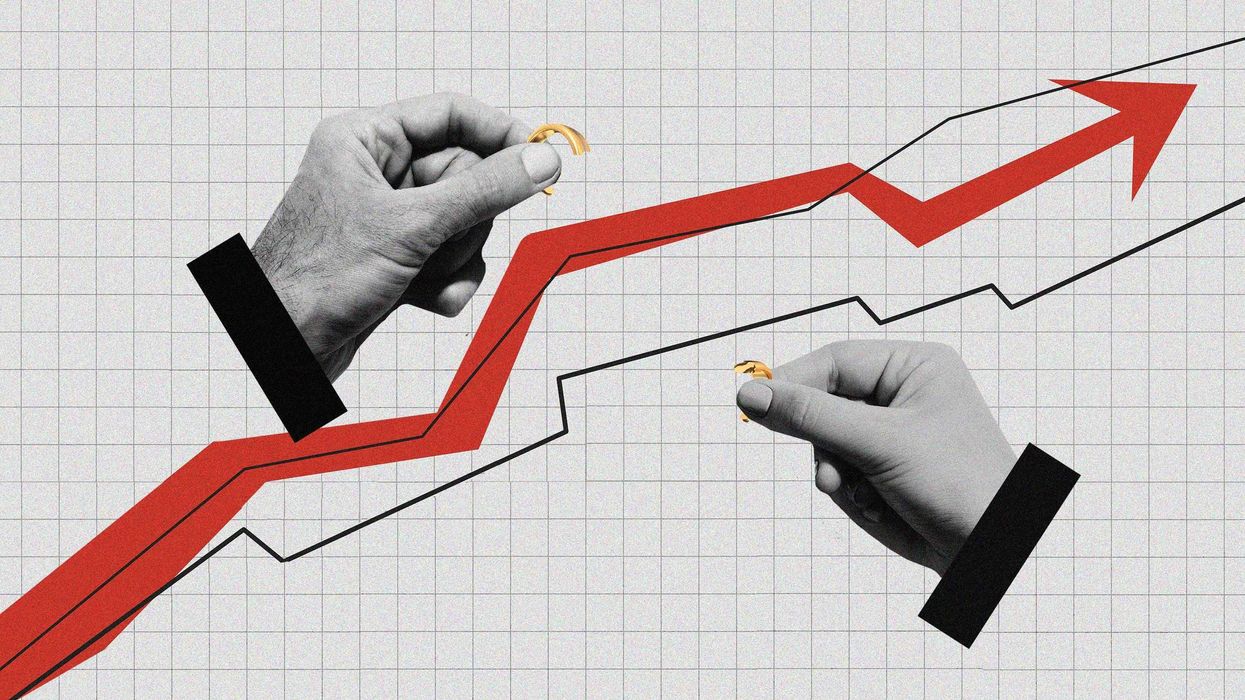Is a “Great Divorce” Really On the Horizon?
Former divorce attorney addresses the TikTok prophesy predicting an ominous fate for the state of modern marriages.

Type the phrase “Great Divorce” into Google, you’ll get results about a theological novel by C.S. Lewis. Type it into TikTok, however, and it’s a completely different story. You’ll see video after video with tens of thousands of likes showing women predicting that a “Great Divorce” is on the horizon. This “Great Divorce” concept has become shorthand for the theory that we will soon be seeing not just a record number of divorces, but a record number of people declining to get married in the first place. From big TikTok creators like Mel Hamlett to divorce attorneys, therapists, moms, and women just noticing trends, many believe that this “Great Divorce era” is already upon us. However, overall divorce rates have been on a consistent decline–so why are experts and others predicting this “Great Divorce”? (Note: as these content creators and most available studies and statistics only address heterosexual marriages, for the purposes of this article, that is the primary marriage configuration we will address here.)
To answer this, let’s start with some other statistics. Sure, the overall divorce rate is down—but there is a skyrocketing divorce rate among those 50 and older. Second, while the divorce rate among younger people has declined, the actual marriage rate has declined as well, showing that fewer people are choosing to take the plunge in the first place. Additionally, the rate of re-marriages has also been markedly declining. In other words, more people are leaving long-term marriages, eschewing marriage altogether, and refusing to participate in the institution a second time. These statistics–of avoiding or leaving marriages–do seem to indicate that overall disillusionment with marriage is on the rise. The question then becomes: Why, and why now? The reason cited by TikTok: Women are DONE. As usual, these TikTokers don’t provide any hard and fast statistics for this claim–so is there any truth to it?
Our cultural narrative around marriage tends to go thusly: Women want to be married. Men love being bachelors and have to be dragged kicking and screaming to the altar, where they then spend the rest of their lives complaining about the old “ball and chain” while their wives bask in the success of getting a man to compromise to her vision of domestic bliss. However, statistics don’t quite back up this vision. Marriage has many benefits, yes—but they’re mostly for men. Men who are married live longer, earn between 10 and 40% more than single men (with marriage itself increasing the earning power of men), have more and better quality sex, and report better overall life happiness. While the prevailing cultural narrative is that women are all dying to get married and men have to be coaxed into it, it’s clear this isn’t exactly the case. Likewise, men themselves appear to be well aware of how they benefit from marriage, as they are much more likely than women to get remarried after a divorce.
On the other hand, we have the statistics on how marriage affects women. Women with children and a heterosexual male partner do the most housework of any demographic—more even than single mothers. Meanwhile, women are working more paid hours, contributing more to the families’ finances than ever, and are much more likely to be equal or primary breadwinners. Even when women are primary or equal breadwinners, they still spend significantly more time on unpaid caregiving and housework than their husbands—who spend their extra time on leisure activities or paid work.
Together, these statistics show that although modern women are much more likely to be making more or as much money as men–and working at least as many hours–they will still be left holding the bag for the “second shift” of domestic labor. As we can see from the fact that married moms do more work than single moms, the mere presence of men in the home seems to create more chores for women, not result in extra help. For example, senior women do better living alone than senior men, while senior men do better living with a wife. The explanation for this is thought to be that women finally have time for their own hobbies and interests when living alone, while men have more time for their hobbies and interests when living with a wife who takes care of him and the home (that same wife who would have much more time for her own hobbies and interests if she lived without him).
Lastly, we can’t ignore the actual danger of being married to men: Women are much more likely to be attacked or killed by the men closest to them. Pregnant women are more likely to die from homicide than from any medical cause of maternal death. Husbands aren’t only a liability as far as creating more chores; they could be literally deadly. Likewise, domestic abuse takes many forms, such as emotional abuse, financial abuse, and coercive control. While not always physically threatening, the risk of an severe mental toll for women married to men can be extremely high.
Thus, we can see how compared to the "more sex and money” benefits that marriage offers men, the statistics about what it has to offer women are frankly pretty bleak. Historical and current statistics show that women themselves are far from unaware of the disadvantages of marriage: about 70% of divorces are initiated by women. That number goes to 90% when you look only at college-educated couples (and as women are consistently and increasingly outpacing men in college graduation, we can assume this number is likely to increase). Anecdotally, I definitely saw this trend when practicing family law. I can safely say that the men in these divorces tended to be much more adrift, in shock, and upset when the relationship ended, no matter how much they had cheated, mistreated their wives, or been generally absent during the actual marriage. As much as men claim that the most horrible fate for women is unmarried with cats, the numbers don’t lie: men are the ones who would rather stay married.
So if men—the supposed main objectors to the institution of marriage—are actually pretty enthusiastic participants in it, that leaves us with the conclusion that TikTok is likely correct: Women are driving the Great Divorce. From the statistics above, it’s clear that women’s preferences are likely the primary driving factors behind the phenomena of late-in-life divorces, less marriages, and fewer second marriages. While it’s obviously difficult to accurately quantify how many single people of either gender are actively avoiding marriage, seeing as women are the ones initiating divorces and refusing to get remarried, the “Great Divorce” trend seems more likely caused by women’s preferences than not.
From the above bummer stats about what marriage entails for women, we can probably pretty easily extrapolate the “why” behind women being disenchanted with marriage. This brings us to our next question: Why now?
Marriage being a pretty bad deal for women is far from a new phenomenon. True, life for women has only gotten better over the centuries–we can now vote, own property, have bank accounts, get no-fault divorces, and actually be allowed to get custody of our own children after a divorce. Inclusion in education and the workforce is the best it’s ever been. One would think that if women were to decide en masse that marriage to men was no longer worth it, it would have been earlier, when marriage was more likely to be closer to domestic slavery than a partnership.
Obviously, there is the explanation that women now finally have enough education and earning power to make that decision, and overall have more and arguably better options than just getting married. However, I think there’s a bit more behind this current trend. I have no hard evidence to back this up, but my theory is that women now have the ability to widely share their experiences via social media. While women’s place in society has changed, it seems like marriage itself–and men–haven’t done the same, and with this improved ability to share and compare experiences, the stigma and isolation that used to result from feeling dissatisfied with your marriage has been lowered. Traditionally, dissatisfaction with mothering, frustration or difficulty with keeping house, an unhappy husband, or even divorce itself has been seen as a failure on the part of women. How many of us have Boomer moms who think spouses should always stay together for the kids, who view divorce solely as a reflection on women, and who maybe even view their own divorces as a personal failure and source of shame, even if they had been treated unfairly throughout their marriage? Today’s women are now able to compare and contrast experiences openly, without shame or stigma, and realize that if marriage is still such a crappy situation for so many women, then maybe the problem is society–not all these women just failing as individuals. Maybe, just maybe, if so many of us are feeling unhappy and finding marriage to be frustrating or impossible, the deck might be stacked against us.
There are myriad online trends exemplifying this. Just type “moms vs. dads eating” into TikTok, and you’ll see video after video of parents eating dinner, wherein the mom has the children hanging all over her and has to fight to get a bite of her own food, and the dads are eating their meal in peace–and not intervening to help at all. Yes, it’s a funny juxtaposition, but it’s also an incredibly depressing one. Do dads not have the same amount of hands and laps as women? Are they not capable of feeding and comforting their own children? Why should one parent do all the work when they could each just do half of it? Thankfully, these videos have a massive amount of commentary on how messed up the depicted imbalance of labor is. There’s comment after comment from women saying something along the lines of, “And they wonder why we don’t want to get married.”
In fact, there are even several accounts that collect these videos showing TikToks of disappointing husbands–or straight-up abusive ones–and adding them to an ever-growing list of reasons to stay single. Such videos can get tens of thousands of likes. Videos showing problematic behavior from husbands and boyfriends also garner commentary from creators of both genders, breaking down how traditional divisions of labor in households are just not worth it for women. In-depth discussions of phenomena like weaponized incompetence, gaslighting, emotional abuse, and so much more are countless and ongoing on social media. Given the popularity of such videos, it’s evident that while these issues may not be new, this level and depth of discourse regarding them clearly is.
And you know what else is new? The level to which straight men are able to get online and make content telling on themselves about their awful views on women and relationships, not only converting each other to these viewpoints, but putting them on full display for women to see. Those “reasons to stay single” accounts? They also collect videos of men saying pretty awful things online. With the backlash to feminism creating a strong online community of men who make whole platforms and personalities out of asserting that women are inferior, there is no end to such content. And TikTok is only the most recent player in disseminating these views: from incel Reddit forums to the recent viral tweet claiming that a common stage in a relationship for men is realizing that you hate your girlfriend, the internet has been spreading insanely damaging and misogynistic content about women and their “ideal” roles in relationships for quite some time. The loudest online male voices regarding marriage, relationships, and gender issues tend to be the Andrew Tate type, ones who talk about how women need to be subservient and how men get to dominate, cheat, and have all their domestic labor done for them. When so many men are making it so clear that they see marriage as ideally equating to free domestic labor and overall unequal partnership–and exposing themselves as misogynistic, insecure, and incompetent babies in doing so–it's even more evident why modern women are so disinclined to get involved with them. Likewise, recent studies indicate an increasing political divide between young men and young women, with women more likely to lean left and men more likely to go far right. When the current far right ideology is so emphatic in its views of women as subhuman and is constantly attacking basic rights like abortion and no-fault divorce, it’s no wonder that it’s predicted that this political divide will contribute to the decline in marriages. Why would women want to marry someone who holds views that dehumanize and oppress them?
Thus, while women’s societal situations are better, and the bar for what they will accept out of a relationship higher, it’s clear that the same cannot be said for their potential husbands. And while many women want better for themselves than they saw their moms have, can we really say we’ve fully undone all of our prejudices about the disproportionate share of the burdens of marriage and child-rearing we expect women to do? Take my parents: my mother made dinner many nights, yes, but she never took me and my sister to activities, took us on outings, drove us to and from school, played with us, helped us with homework, bathed or groomed us, shopped for us, met with our teachers, went to our recitals, took care of us when we were sick, took us to medical appointments, or paid for our school, sports, clothes, summer camps, classes, and toys, while my father did all that.
Oh wait, so sorry–I got my nouns confused–my mother took us to activities, on outings, played with us, helped with homework, maintained our hygiene, shopped for us, knew our teachers and friends, went to our competitions and shows, took us to doctors appointments, and paid almost exclusively for tuition, activities, and everything else. Weren’t you clutching your pearls for a second about how a mother could be so uninvolved? Weren’t you giving my dad so much credit for being such an attentive caregiver? Now that you know it’s a mom who did that–doesn’t that just sound normal and unremarkable? My father made dinner most nights, yes, and he always gets a big ‘ooo and aah’ of reverent approval for that (despite having been an extremely lazy chef who also left all the dishes to his spouse). Does a part of you give him credit for that one nontraditional contribution, when that’s basically all he did, while my mom did everything else, all while working full-time and being the primary breadwinner by a long shot?
As a society, it’s impossible for each of us to disentangle from all the deep-seated views we have on traditional gender roles at the drop of a hat. That process takes time, and what I have gleaned from the “Great Divorce” discourse is that women would rather wait for society to catch up than sacrifice their happiness by gambling on marriage. Marriage is no longer our only option and, statistically speaking, it has the proven capacity to possibly be the worst one. Likewise, women often have larger and more varied social structures than men, with better friendships in general (we could do a whole other article on how patriarchy keeps men from forming lasting and supportive non-romantic relationships). When the options are to enjoy your own money, peace, time, and friends, or to spend that time, money, and mental energy taking care of a grown-ass man who can’t wash a dish, refuses to learn, and overall might have some pretty messed up expectations for your emotional and physical labor–can it really come as that much of a surprise that more women are choosing the former?
Say what you will about this Great Divorce, but it’s hard for me personally not to see it as a good thing. There are two possible ways for this to turn out: either women get to enjoy the fruits of their own labor for once, or men finally step up as a group and become worth sharing a life with. Either way, women get to shed the deadweight that’s been dragging them down for centuries. It’s hard not to be happy about that.




